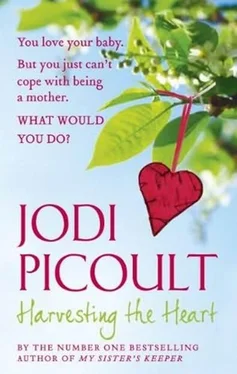The wheels of the bassinet throbbed in my head, and I knew Max was coming long before the night nurse arrived. He was screaming. “Hard to believe they were worried about his lungs,” she said, holding him out to me. For a moment I did not reach for him. I stared angrily at this greedy thing, who had twice in one night taken me away from all I had left of my mother.
Paige
When God wanted to punish me, He granted my prayers. I spent a year in the circle of Jake’s arms, long enough to believe it was where I really belonged. I spent many evenings at the Flanagans’, clapping along as Jake’s father sang old Gaelic songs and the littlest children hopped and jigged. I was accepted at RISD, and Jake took me out to dinner to celebrate. Later that night, when we wrapped the heat of our bodies around each other like a blanket, Jake told me he would wait for me through college, or grad school, or the rest of my life.
In May I came down with the flu. It was strange, because the bug had passed around the school in early January, but I had all the same symptoms. I was weak and chilled, and I cingcauseth=ould not keep anything down. Jake brought me heather he’d picked from the side of the road and sculptures he made with wire and old Coke cans at work. “You look like hell,” he said, and he leaned down to kiss me.
“Don’t,” I warned him. “You’ll catch it.”
Jake had smiled. “Me?” he said. “I’m invincible.”
On the fifth morning I had the flu, I stumbled into the bathroom to throw up, and I heard my father walking by the door. He paused, and then he went down the stairs. I looked into the mirror for the first time in days, and I saw the thin, drawn face of a ghost: pale cheeks, red eyes, cracks at the corners of my mouth. And that’s when I knew I was pregnant.
Because I was not sick, I forced myself to get dressed in my school uniform, and I went down to the kitchen. My father was eating cornflakes, staring at the bare wall as if there were something there he could see. “I’m better, Dad,” I announced.
My father lifted his eyes, and I saw a flicker of something-relief?-as he gestured to the other chair. “Eat something,” he said, “or you’ll blow away.”
I smiled and sat down, trying to block out the smell of the cereal. I concentrated on my father’s voice, laced with the sounds of his homeland. One day, Paige, he used to say, we’ll be takin’ you to Ireland. It’s the only place on God’s great earth where the air is pure as fine crystal and the hills are a green magic carpet, streaked with blue-jewel streams. I reached for the cornflakes and ate several out of the box, knowing I had learned the lesson he hadn’t: there was no going back.
The cornflakes tasted like cardboard, and I kept staring at my father, wondering exactly how much he knew. My eyes began to swim with tears. I had been his biggest hope. He would be so ashamed.
I went through the motions of school that day like rituals, numbly going to my classes and taking notes from teachers I did not hear. Then I walked slowly to Jake’s garage. He was bent over the hood of a Toyota, changing spark plugs. When he saw me, he smiled and wiped his hands on his jeans. In his eyes I could see the rest of my life. “You’re all better,” he said.
“That,” I told him, “isn’t quite true.”

I did not need parental consent for an abortion, but I did not want my father to know what I had done, so I committed the greatest sin of my life one hundred miles away from my hometown. Jake had found the name of a clinic in Racine, Wisconsin-far enough from Chicago that no one would recognize us or pass along rushed whispers. We would drive there early on Thursday, June 3, the first available appointment. When Jake had told me of the wait, I had stared at him in disbelief. “How many people,” I whispered, “could there possibly be?”
The hardest part was surviving the weeks between when I first knew and when we left for Racine. Jake and I did not make love, as if this was our punishment. We’d go outside every night, and I would sit in the valley of of‘€he his legs, and Jake would cross his hands over my stomach as if there were something he could truly feel.
The first night, Jake and I had walked for miles. “Let’s get married,” he said to me, for the second time in my life.
But I did not want to enter a marriage because of a child. Even if Jake and I wanted to marry someday, a baby would have changed the entire reason behind it. After every argument and every petty disagreement in years to come, we would both blame the child that brought us into the mess. And besides, I was going to college. I was going to be an artist. This was the reason I gave Jake. “I’m only eighteen,” I said. “I can’t be a mother now.” I did not add the other reason that ran through my mind: I don’t know if I ever can be one.
Jake had swallowed hard and turned away. “We’ll have others,” he said, resigning himself. He lifted his face to the sky, and I knew that traced among the stars, he saw-as I did-the face of our unborn child.
On the morning of June 3 I got up before six o‘clock and slipped out of the house. I walked down the street to Saint Christopher’s, praying that I wouldn’t see Father Draher, or an altar boy who went to Pope Pius. I knelt in the last pew and whispered to my twelve-week-old baby. “Sweetheart,” I murmured, “Love. My darling.” I said all the things I never would get to say.
I did not enter a confessional, remembering my old friend Priscilla Divine and her knowing voice: “There are certain things you just don’t tell a priest.” Instead I silently recited a string of Hail Marys, until the words all ran together and I couldn’t distinguish the syllables in my mind from the sound of my pain.
Jake and I did not touch on the way to Racine. We passed thick rolling farmland and fat spotty Holsteins. Jake followed the directions the woman on the phone had given him, sometimes pronouncing the names of the highways out loud. I unrolled the window and closed my eyes into the wind, still seeing the rush of green, black, and white; the flat, level land and its ornaments, tassels of new corn.
The small gray building had very little to mark it for what it was. The entrance was at the back, so Jake helped me out of the car and led me around the corner. Surrounding the front door was an angry, snaking cord of picketers. They wore black raincoats splashed with red, and they carried looming signs that said MURDER. As they saw Jake and me they thronged about us, crying out gibberish I could not understand. Jake put his arm around me and pushed me through the door. “Jesus Christ,” he said.
The tired blond woman who served as a receptionist asked me to fill out my personal information on a white card. “You pay up front,” she said, and Jake removed his wallet and, from it, three hundred dollars he’d taken from the cash register at his father’s garage the night before. An advance, he’d called it, and he’d told me not to worry.
The woman disappeared for a moment. I looked around the white walls of the room. They were free of posters; there was only a handful of dated magazines for people to read. The waiting area held at least twenty people-mostly women-all looking as if they’d stumbled in by mistake. In the corner was a small paper ct s‘€hanarton filled with plastic blocks and Sesame Street dolls, just in case, but there were no children to play with them.
“We’re a little backed up today,” the blond woman said, returning with a pink information sheet for me. “If you want to take a walk or something, it will be at least two hours.”
Читать дальше













